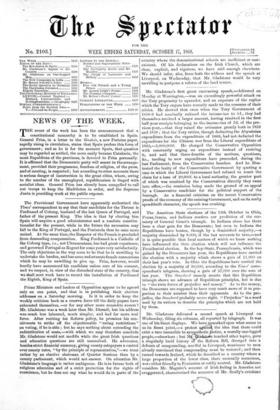Prime Ministers and leaders of Opposition appear to be agreed
only on one point, and that is in publishing their election addresses on a Saturday morning. Is it in order to keep the weekly criticism back as a reserve force till the daily papers have exhausted themselves, —or for any other more recondite reason ? Mr. Gladstone was a week later than Mr. Disraeli, but his address was much less laboured, much simpler, and had far more real force. After reciting his Reform policy, he promises his con- stituents to strike off the objectionable "rating restrictions" on voting, if he is able ; but he says nothing about extending the redistribution of seats,—with which we may therefore conclude Mr. Gladstone would not meddle while the great Irish questions and education questions are still unresolved. He advocates, besides strict financial economy, giving county ratepayers a control over county rates, "by the principle of representation,"—we trust rather by an elective chairman of Quarter Sessions than by a county parliament, which would not answer. On education Mr. Gladstone's language is rather ambiguous. He is in favour both of religious education and of a strict protection for the rights of conscience, but he does not say what he would do in parts of the
country where the denominational schools are inefficient or non- existent. Of his declarations on the Irish Church, which arc clear, explicit, and vigorous, we have said .enough elsewhere. We should infer, also, from both the address and the speech at Liverpool, on Wednesday, that Mr. Gladstone would be very unwilling to postpone a reform of the land tenure.


































